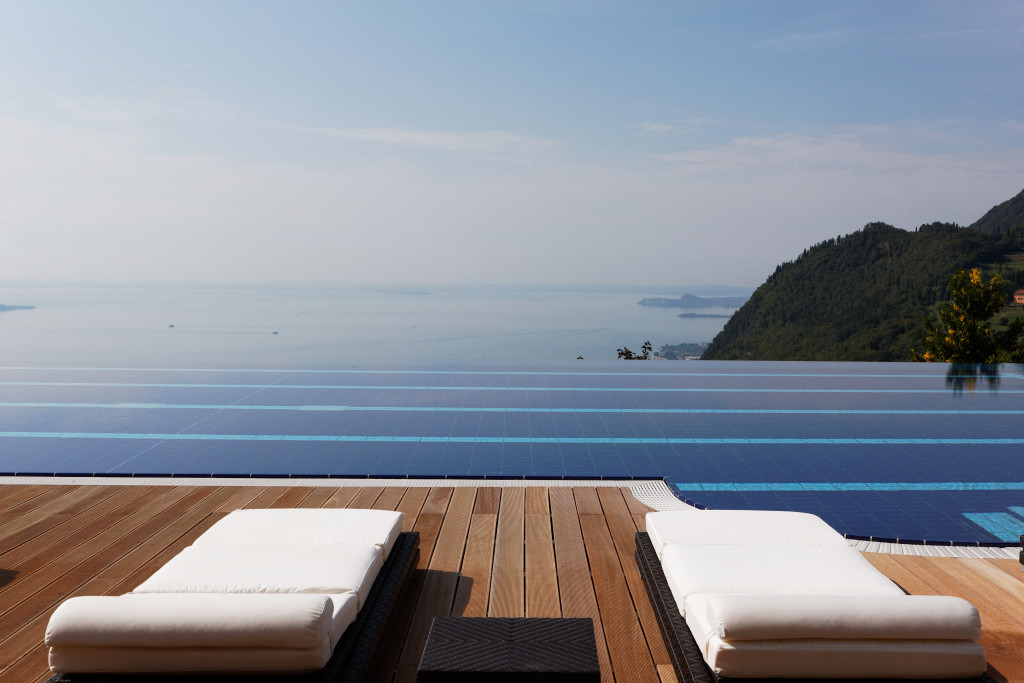The well-wooded, steep west coast of Lake Garda, in Northern Italy, is blessed with an almost Mediterranean climate. Here, against the snowy backdrop of the Alps, hundreds of years of careful cultivation have transformed the sunny slopes in a landscape of terraced gardens of olive and citrus trees. It is a place of great beauty, the ideal spot to relax and recharge. Just the perfect environment for the first Lefay Resorts, a new 5-star eco-resorts brand based on a modern notion of luxury, a strong commitment to environmental sustainability and a holistic concept of wellness, embracing the whole holiday experience. The Lefay Resorts project is the brainchild of entrepreneurs Alcide and Liliana Leali, who in 2003 sold the Air Dolomiti airline they had founded to Lufthansa.
Opened in 2008, the Lefay Resort & Spa Lago di Garda is set inside an 11 hectares natural park. Built from scratch, it sits on a terrace overlooking the lake, over the town of Gargnano, and is barely visible from the water.
“The structure as built is the embodiment of the core values of our brand – comments Alcide Leali jr, managing director of the resort (partner of the prestigious networks Small Luxury Hotels of the World, Healing Hotels of the World, Virtuoso and Kiwi Collection) -. For us, luxury is not synonymous with extravagance and waste. On the contrary, it revolves around the idea of space, nature, silence, time for oneself, comfort and service. It is a concept which can only be put in practice through respect: of the natural environment, of the terroir and of people. Indeed, we see it as the duty of a luxury brand to be sustainable”.
The brief to the architects was to design a spa resort that was efficient in terms of logistics and energy saving and could blend unobtrusively into the landscape. Therefore, it was decided not to build a single, big block but a series of low structures, set into the hillside; the roofs are covered in vegetation, both to minimize the visual impact and to ensure insulation from the cold in winter and the heat in summer. Furthermore, rooms and spa face south, to benefit from solar irradiation in winter, whereas in summer a mobile shade systems protects them from the heat.
As sustainability means respect both of the natural and the cultural environment, the resort design harks back to local architectural elements, such as the “lemon houses”, typical Lake Garda constructions made of wooden and stone pillars. The interior decoration is contemporary and quasi minimalist, yet the use of local materials – red Verona marble, Italian walnut and local olive wood – and untreated fabrics gives a warm and natural feeling to the whole. All of the 93 suites are spacious and filled with light, and every space is designed “to enhance the feeling of wellbeing in the guests from the moment they come though the main gate”, says Leali jr.
To achieve the Lefay all-encompassing sustainable vision, a huge amount of energy saving technologies and systems using renewable resources have been integrated into the project. A biomass plant fuelled by wood chips from local wood and garden waste provides about 70% of the thermal energy needed by the entire structure. A micro-turbine cogeneration plant fuelled by natural gas produces both electrical and thermal energy. There’s also a photovoltaic system, located in the domed ceiling of one of the restaurants; together with the micro-turbines it guarantees about 60% of the resort’s electricity requirements. The absorption cooling system supplies 75% of the resort’s cooling requirements and it cools using the exhaust heat from the micro-turbines and biomass boiler. A methan powered boiler produces another 10% of the annual energy consumption.
Energy consumption in the entire structure is kept to a minimum thanks to fully automated control and monitoring systems that maximize efficiency and save energy.
All this has enabled the resort to reduce its carbon emissions by 1,130 tons per year, and Lefay is now committed to compensate for its remaining CO2 emissions quota definitively.
Water saving is another priority. Rainwater is collected and stored in a tank and used to irrigate the hotel gardens. The water emptied from the swimming pools is purified and reused. A software helps manage water consumption from the water supply, reducing the amount of water used by 50%.
“For us sustainability is an ongoing commitment, that embraces all aspects of our day-to-day activity”, explains Alcide Leali jr.
To involve guests in sustainable policies, there’s a Green Book suggesting simple everyday eco-friendly actions.
The Lefay Resort&Spa concept is firmly rooted in the Italian and local culture. For the 3,000 sqm plus spa the Leali family have developed a proprietary method. The Lefay cosmetic line is made of natural, organic and local products, for instance the olive oil produced in the family estates on Lake Garda and in Tuscany.
The same olive oil is one of the main ingredients in the two restaurants, La Grande Limonaia and Trattoria La Vigna. As here food is an integral part of the well-being experience, executive chef Matteo Maenza has developed menus following the principles of the Lefay Vital Gourmet philosophy, using only fresh and seasonal local produce.
Last but not least, Lefay Resort is active in promoting the local area, in employing staff from nearby communities and in using local suppliers.
“I think we are still unique – says Alcide Leali jr -. Few other resorts in Italy have as comprehensive an approach to sustainability as we do”.
By the end of 2015 the Leali family will unveil the details of a second Lefay Resort&Spa to be built in the Dolomites mountains region.
And they are currently scouting for a suitable estate for a country resort in Tuscany or in Umbria.
Lefay Resort&Spa Lago di Garda


